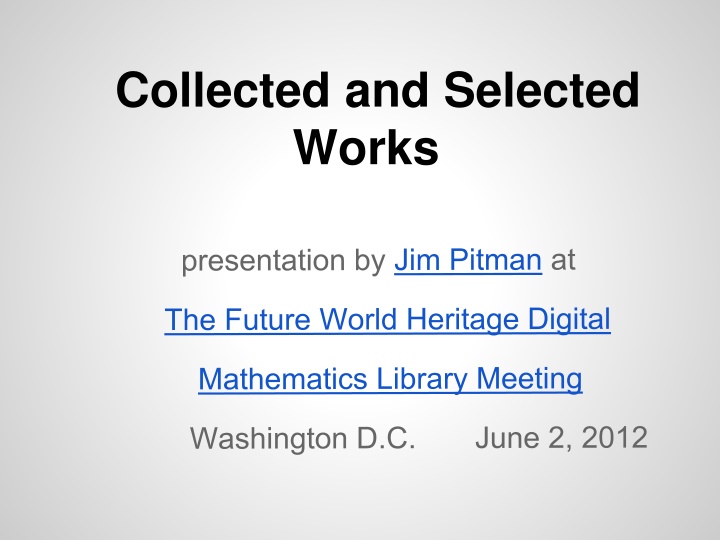
Efforts in Digitizing and Preserving Collected Works in Mathematics
Explore the transition of traditional collected works to digital formats, citing strengths and weaknesses, challenges in production, and permissions. Learn about initiatives like Celebratio Mathematica and the integration of WDML to streamline the creation of collected works volumes. Discover broader open knowledge efforts and funding priorities supporting end-to-end applications for authors and editors.
Download Presentation

Please find below an Image/Link to download the presentation.
The content on the website is provided AS IS for your information and personal use only. It may not be sold, licensed, or shared on other websites without obtaining consent from the author. If you encounter any issues during the download, it is possible that the publisher has removed the file from their server.
You are allowed to download the files provided on this website for personal or commercial use, subject to the condition that they are used lawfully. All files are the property of their respective owners.
The content on the website is provided AS IS for your information and personal use only. It may not be sold, licensed, or shared on other websites without obtaining consent from the author.
E N D
Presentation Transcript
Collected and Selected Works
Background Traditional Collected/Selected Works volumes from the print era: http://mathematics.library.cornell.edu/additional /Collected-Works-of-Mathematicians (bibliography by Steven Rockey) Strengths/weaknesses of the genre: + themes, history, biography, bibliography +/- access, indexing - production effort, permissions, cost Transition to digital: aim to retain + reduce -
Selected Works in Probability and Statistics Initially with IMS, then with Springer: http://www.springerlink.com/content/v34145/ 9 vols by distinguished authors (2010-12) available both in print and freely(?) online. Issues: - incompatible with Springer's ebook model - effort and cost to acquire permissions - still poorly indexed (remedy?)
Celebratio Mathematica http://celebratio.org/ "Collected Works for the Digital Age" by Mathematical Sciences Publishers open access web publication series of collected works volumes electronic version primary can provide copies or links flexible content types (photos, scans, html) comprehensive updatable bibliography new business model: donations
WDML Integration Make creation of Collected/Selected Works volumes easy by WDML supporting high quality open metadata with author identifiers full text with open license for reuse editorial workflow (collection/organization/ deduplication/identification/tagging) A successful WDML should support a broadly distributed effort to provide volumes for as many distinguished authors as community editorial effort can support.
Broader Open Knowledge Efforts WDML should benefit from participation in the broader open biblio community supported by the Open Knowledge Foundation Open biblio data stores o http://thedatahub.org/group/bibliographic Open biblio data principles/formats o http://openbiblio.net/principles o BibJSON http://bibjson.org/ Open biblio software o BibServer http://bibserver.berkeley.edu/
Funding Priorities Support for end-to-end applications which engage authors and editors to contribute their time to enhancing, expanding and curating a WDML. Basic open framework and tools now available. Still needed: oversight, project management and programming, especially for o curatorial workflows (entity extraction/tagging) o customization of general tools for math community (LaTeX/BibTeX/MathJaX/MSC/MathPeople) o RePEc-like aggregation of component libraries plan for governance, maintenance, sustainability of an open source community
